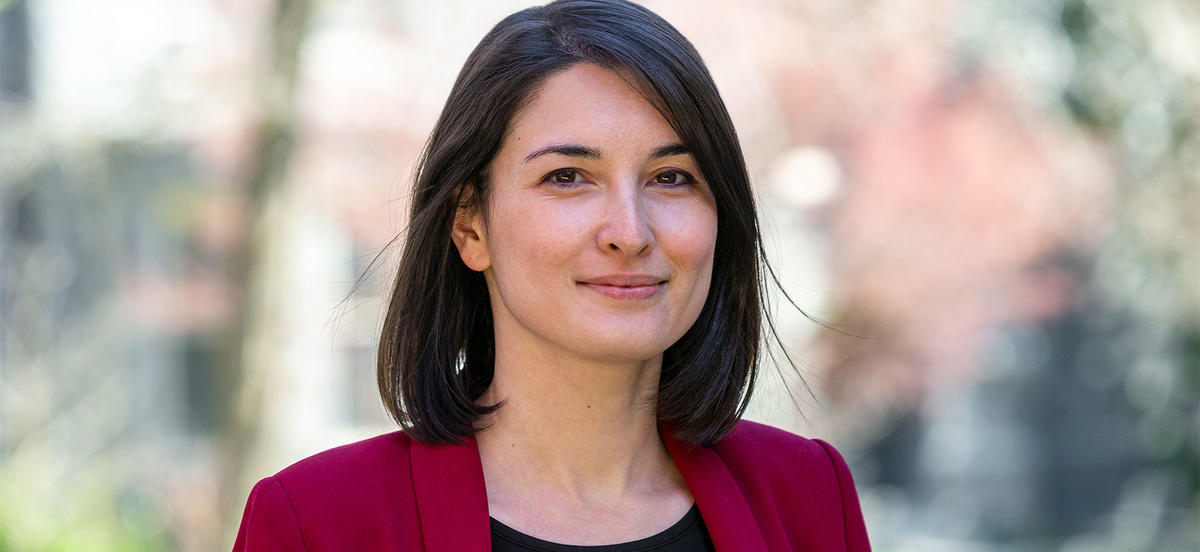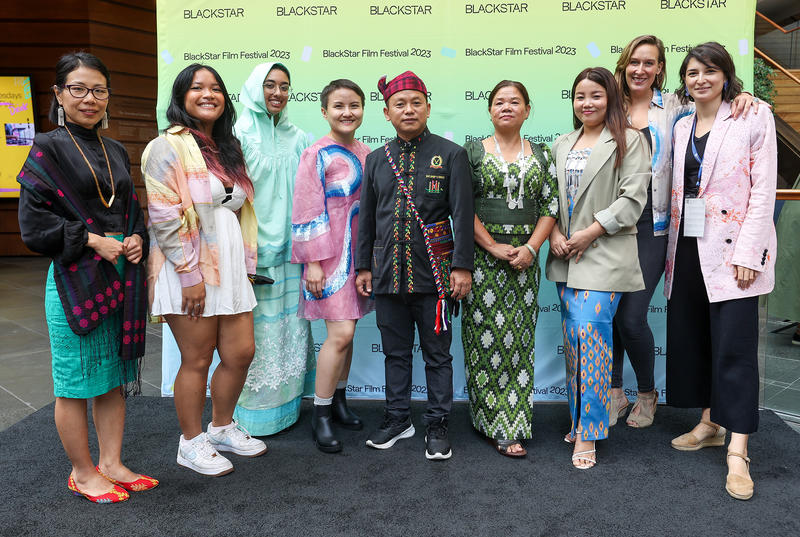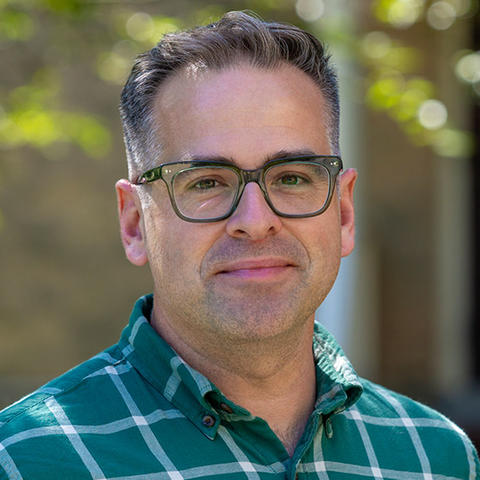Faculty Focus: Assistant Professor of Anthropology and Visual Studies Emily Hong

Photo by Patrick Montero.
Details
With work that combines activism, visual anthropology, and film, Hong has found an eager audience in Haverford’s “very politically active and very engaged” students.
If Assistant Professor of Anthropology and Visual Studies Emily Hong had allowed her first encounter with anthropology to color her view of the discipline, it’s likely she would never have chosen to pursue it.
“My first exposure to anthropology was when an anthropology student asked me, ‘Hey, can I measure your head for my homework?’ It wasn’t the best first impression,” she recalls. “I didn’t know then what anthropology could be. I was interested in political life as a student activist. I was interested in art, and it didn’t seem to me at the time that anthropology could be a home for that.”
But a very comfortable home it has become. Hong, who grew up surrounded by her mother’s abstract paintings steeped in traditional Korean techniques and assembled an art portfolio to support her application to college, found her calling as an activist at the young age of 14. That's when she joined local opposition to rezoning the last farm in Setauket, Long Island, where she grew up (the campaign succeeded and the farm was preserved as a land trust). Just a few years later, when she was touring colleges, the activists she encountered on Columbia University’s Manhattan campus cemented her decision to attend.
While a student, she engaged in organizing efforts surrounding the Saffron Revolution in Myanmar, the burgeoning crisis in Darfur, Sudan, which persists to this day, and as a supporter of Amnesty International, where, later, she would serve on its U.S. board of directors. Her undergraduate thesis was focused on the 1984 gas disaster in Bhopal, India, which remains the world’s worst industrial disaster, and the survivor-led movement for justice that followed it. In preparing her thesis, she discovered a branch of anthropology that resonated with her identity as an activist and would eventually set her on the path she’s followed.
“In doing that research, some of the best sources that I came across were ethnographies. I was amazed that there was a social science where there was no need to justify why we were interested in activists and what they do, whereas other social sciences were more interested in the state and geopolitics,” she recalls. “These anthropologists were so attuned to what I came across in my research. They cared about what activists have to say, what they do, in ways that are not featured in mainstream media. That was the first time that I felt this could be a path for me.”
Despite her growing interest in anthropology, Hong originally sought to channel her activism into a career and moved to the border of Thailand and Myanmar to work with numerous organizations focused on human rights and environmental justice. But, eventually, her lingering interest in anthropology won out.
“I thought that anthropology was the only discipline that actually had a kernel of truth about the things I saw working for human rights and grassroots organizations. It felt that this was a field that knew what was going on,” Hong says. “Along the border, there was so much urgency to the work that was happening. Oftentimes, there wasn’t the luxury to sit back and think about broader philosophical questions, whereas academics have that capacity to consider longer-term research questions and explore them.”
Later, while in graduate school at Cornell University, her interest in filmmaking and activism coalesced around the field of visual anthropology, which has allowed her to meld her interests and present a unique form of scholarship through the numerous films she has created. Finding a disciplinary home in visual anthropology, Hong says, has allowed her to explore what sparks activists to pursue action and, moreover, what keeps them motivated and engaged in the long term.
“One of the things I love about being a filmmaker is that you get a lot of privileges that others — if you have written scholarship — do not. You get to show your work and receive feedback on it right away,” Hong says. “And for audiences, when you watch a film, you have an opportunity to build a connection with someone you might never actually meet. I think that’s important for decolonizing and moving past old-school anthropology where they talked about people as fixed in time and place. We can't keep generalizing communities the way anthropologists did in the 1920s.”
At Haverford, where Hong arrived in 2019, her work is equally relevant in multiple disciplines. As a dual-appointed professor in anthropology and visual studies, her classes are often interdisciplinary and cross-listed in Peace, Justice, and Human Rights or East Asian Languages and Cultures, like her spring class “Visions of Justice: Legal Consciousness and Intersectionality in Asian Cinema.”
She’s found an eager audience at Haverford, where students are “very politically active and very engaged. They’re not just reading theory for theory’s sake but are really applying it to what’s going on around them. That’s a big part of what really appeals to me about teaching here.”
Hong, who was born in Seoul and grew up in several countries before settling on Long Island, focuses on Asian solidarity struggles through the lens of decolonization and feminist sensory ethnography. To advance her work, which is informed by her experiences as a multiracial immigrant with “ancestors on both sides of the colonial equation” she co-founded Ethnocine Collective with several other visual anthropologists and filmmakers. The collective’s approach and techniques were outlined in an article “Feminist Sensory Ethnography: Embodied Filmmaking as a Politic of Necessity” she wrote and published in Visual Anthropology Review with fellow filmmaker and professor Elena Guzman.
Hong's short films and installations have explored the journey of three women refugees from Myanmar through Thailand and, eventually, New York; five women performance artists expressing themselves in the streets and markets of Yangon, Myanmar; and two sanitation workers’ struggle for a living wage in Ithaca, New York. Her most recent film, Above and Below the Ground, captures Myanmar’s first and only country-wide environmental movement through the people — Indigenous women activists and punk rock pastors — who led it. It tracks their efforts to halt a Chinese-built dam project that would have flooded an area the size of Singapore and displaced countless people.

After debuting last summer, it continues its world tour with stops at the Big Sky Film Festival in Missoula, Montana, San Francisco, and an art museum screening in Taiwan, where Hong has been surprised by its popularity.
“I think it’s because we are looking at a Chinese-built dam project and exploring the impacts of Chinese foreign policy in the region. But that is certainly not unique to either Myanmar or Taiwan,” Hong says of China’s influence. “Across Asia in general, especially Southeast Asia, Chinese foreign investment is dominant. So what does that mean for ordinary people who don’t necessarily have a say over whether there’s a development project in their area?”
Now that the film — filmed largely by Hong alongside a team of collaborators during a rare five-year period of fledgling democracy between military dictatorships in Myanmar — she is reflecting on the questions that have arisen during screenings for her current book project on environmental activism titled Borderland Solidarity. She’s also begun a new collaboration with her mother, a project she says she was inspired to pursue through the work of her students.
“My students at Haverford have done a lot of incredible autoethnographic work, really exploring their own personal experiences and with their families,” Hong says. “To me, that’s the power of autoethnography. It’s not just autobiography; it’s deepening your understanding of yourself in relation to others and in relation to broader structures of power. That’s one of the tools in our toolbox that’s helping us move away from a colonial approach to doing anthropological research.”
The project, a video installation with the working title Shifting Perspective, will explore human-environment relationships in a time of deep ecological crisis. The title signals the pair’s interest in autoethnographic research that is as much about the journey as the resulting destination, says Hong.
“I’m an anthropologist who is interested in what it means to be human. My mom is a landscape painter who is almost entirely focused on the natural world,” she says. The pair is interested in unearthing eco-feminist practices from their own ancestral heritage in Korea’s Jeolla Province, a place known for its natural beauty and as a hotbed of activism.
“Due to systems of colonialism, imperialism, and capitalism, many of us have become so separated from our ancestral land–that core relationship was once integral to who we are, and has so much to teach us about how to sustain life on this planet for present and future generations,” says Hong.




